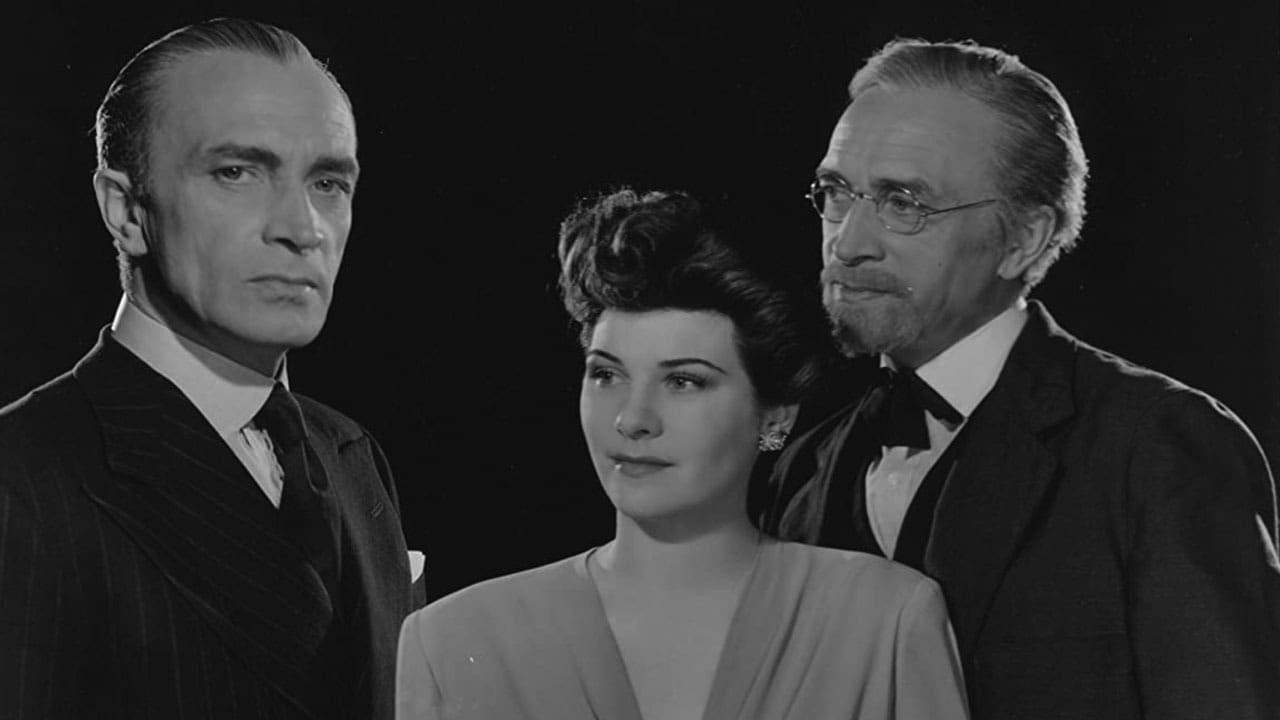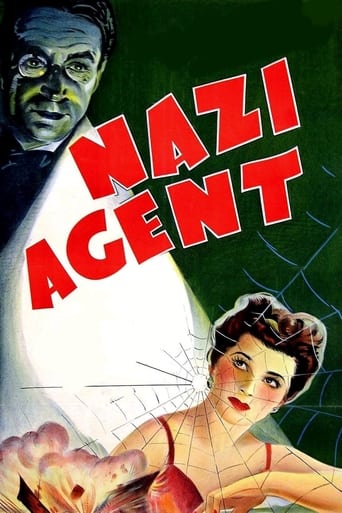

This movie is the proof that the world is becoming a sick and dumb place
... View MoreSERIOUSLY. This is what the crap Hollywood still puts out?
... View Morejust watch it!
... View MoreAt first rather annoying in its heavy emphasis on reenactments, this movie ultimately proves fascinating, simply because the complicated, highly dramatic tale it tells still almost defies belief.
... View MoreIn one of his last roles, Conrad Veidt plays both the GOOD twin and the EVIL twin, during WW II. The "bad" twin tries to talk the "good guy" into helping the dark side, but he doesn't want to. According to IMDb, this was released in March of 1942, so just a couple months after the U.S. was dragged into WW II, in December of 1941. Just like the Bette Davis films, or every other "twins" movies, one of them poses as the other. Veidt would die quite young at age 50.....heart attack. Mostly slow. Predictable. No big surprises here, but an entertaining WW II film. The suspense of watching him maneuver as he tries to avoid being found out as an imposter. This could have been a Hitchcock, but its not. This was Jules Dassin's second film as director, making him the young age of 31 when the film was made. Not bad.
... View MoreThis was a nice little programmer from the '40s that played the lower half of double-features. CONRAD VEIDT is interesting (as always) as a pair of identical twins, one of whom is a Nazi agent. When the bad brother is killed, the good brother takes his place and has to convince everyone that he is the loyal Nazi. Only gradually do a couple of people come to realize who the man really is.Veidt excels in the kind of role he always fared well in, especially riveting as the bad twin. Not the leading man type, he nevertheless manages to hold the screen with his histrionic finesse at playing either smooth villains or men with deeper convictions of honor.ANNE AYARS is the lovely romantic lead and the supporting cast, which includes MARTIN KOSLECK as a fierce Nazi (a role he's played so often and so well) is more than adequate.Good entertainment of its kind, it's a low-budget film directed by Jules Dassin.
... View MoreConrad Veidt's career in European (and American) film from 1919 - 1939 was one as a notable star. He had played Cesar the Sonabulist in THE CABINET OF DR. CALIGARI in 1919, and been a star ever since. In the silent film period it was easy for him to have an international audience as Gwynplaine in THE MAN WHO LAUGHS and as King Louis XI of France in BELOVED ROGUE (with John Barrymore). But he was anti - Nazi and Veidt left Germany in 1933 and settled in England, where he remained a star. His last film in England of greatness was as the evil vizier Jafar in THE THIEF OF BAGHDAD. Then he went to Hollywood.Most Americans recall him for his American films, although he did not make many in his last three years (1940 - 1943). These included a comic villain in WHISTLING IN THE DARK, a selfish Swedish scoundrel in A WOMAN'S FACE, and Nazis in CASABLANCA (his best recalled performance - as Major Strasser), ESCAPE, and ALL THROUGH THE NIGHT. Twice he portrayed anti-Nazi Germans: ABOVE SUSPICION (where he is aiding Joan Crawford and Fred MacMurray, and the villain is Basil Rathbone!), and this film - probably the most interesting of the movies he made in Hollywood. The plot is simple. Veidt plays twin brothers, one of whom has been living in the U.S. since World War I, having gotten sick of the militarism and racial crap at home. The younger brother remained behind as a dedicated careerist Nazi. The younger brother has been sent to the U.S. as a "diplomat" but in reality to head a sabotage ring. He uses some of his agents to locate the older brother, and blackmail him into acquiescing into working for the Vaterland again. The older brother is forced by circumstances (relatives in Germany may be executed or tortured if he refuses). But when he learns of the various sabotage acts planned, and when the ring members kill one of his closest friends, the older brother fights back. He confronts and kills the younger brother, and pretends he is the younger brother. Then he proceeds to destroy the sabotage ring.Veidt's Nazis were quite convincing, as he obviously based them on the people he met in Berlin in the 1920s and 1930s. Major Strasser, for example, is very businesslike - see how he confronts Rick with his file at the start of CASABLANCA and shows little concern when Rick starts reading it - and usually intelligent. He is also ready to turn into a subtly deadly threat, as when he tells Elsa about the cheapness of life in Casablanca. So the young careerist is quite true to form.But the older brother is fascinating. The issue of the "good German" was difficult to get across after 1941, as most Americans saw Hitler's Germany as a real, viable threat. It was rare, in the movies of those years, to think of making a film about Germans who were decent (it was actually easier to show Italians who were decent - see Forunio Bonanova's Italian general in FIVE GRAVES TO CAIRO). If a German was good or sympathetic, he or she might have been Jewish. But Veidt's two brothers are upper crust junkers. They are part of the establishment. The older brother was in the army (unlike the younger one), so he knew what was expected of the German nobility. But he got to dislike the arrogance of the class towards all others. So he fled his native land to escape what he hated.Veidt's not the only good German in the film. For every younger brother, and Martin Kosleck, and Deborah Tree, there is a Frank Reicher and Anna Ayars who supports the decency wiped away by the Nazi regime. Veidt's older brother fall for Ayars, and in one sweet moment one sees what the Nazis have destroyed. They are seated in a car alone, and have put on the radio. The moon is out, and it is a moment for love-making. But the radio plays a piece by Felix Mendelsohn (who was Jewish, and whose music was forbidden by the Nazi regime in Germany). Ayars, sadly, says "Verboten.", and starts turning it off. Veidt gently stops her and says, "Just this once." They cuddle listening to the music.Veidt also demonstrates a trait which (oddly enough) he can share with the Nazi Kosleck. The older brother's hiding spot in America was discovered by Marc Lawrence, who has sold his services to the Nazis. But later (after the older brother has begun impersonating the dead younger one), Lawrence returns to squeeze more money out of his German employers. Kosleck tells this to Veidt (and it is obvious that Kosleck is disgusted by this greedy American). Veidt says he'll speak to Lawrence. He does open the safe and give Lawrence the money without a word. Then after Lawrence puts the money in his pocket, Veidt grabs him around the neck and with a fierce look in his eye tells him never to ask for another extra cent beyond his salary again if he knows what is good for him. Lawrence is thoroughly frightened of his "employer" after that - and the viewer actually sides with Veidt at that moment even if he had been the younger brother instead of the older one.NAZI AGENT was a programmer, but it shows what would have been Veidt's ability to play a hero in American films. If he had survived World War II he probably would have been a star along the lines of his French contemporary Charles Boyer, playing good characters as well as bad ones. He did not have the fortune to survive, but we know what he might have been like.
... View MoreIn 1926 Veidt made another film in which he played a good brother and a bad brother--The Brothers Schellenberg. They both came from an educated but penniless class; the good brother founded a commune and the bad one was a ruthless, social-climbing capitalist. The good brother, as I recall, had a beard and wore rumpled clothes, while the bad one was clean-shaven and and had an elegant wardrobe of evening clothes.... In Nazi Agent, the two brothers have similar physical distinctiveness but now they of the landowning class: the gentle academic driven from Germany by the Nazi aversion to historical truth, and the potently Nazi German Consul in "State City." The twist is that the good brother must disguise himself as the bad brother in order to make his contribution to the anti-Nazi effort by breaking up a nest of spies. It seems to me that the twin-substitution plot usually involves women, not men--with the notable exception of Dead Ringers...? Veidt gets to do what Jeremy Irons did, play twin A pretending to be twin B in such a way that the audience, but not twin B's associates, sees the difference. Even old Fritz, who has known the twins from childhood, recognizes Otto by a scar, not by his manners.The film seems to have been made before Pearl Harbor and released afterwards; in the world it depicts, Canada has joined the war but the U.S. is still on somewhat friendly terms with Germany.Another viewer commented that Veidt is not sexually attractive. Hmm. I think that the character he plays in this film is not supposed to be very sexually aggressive--the big romantic scene does not even involve a kiss, and the bookseller twin has been up to this time someone who is more interested in rare stamps than in women. But one might check out his two films for Michael Powell, or Escape, or A Woman's Face, in all of which his character is supposed to be, and is, extremely sexually attractive. It is interesting that in both Escape and A Woman's Face he at first appears as sexy and charming, in different ways, a real Prince Charming for the very different heroines of the two films. Then, towards the end of the films, he reveals himself for the ruthless Nazi he is, showing extreme cruelty of various kinds.So although Veidt could turn on and off the sexiness and otherwise vary his characters, he made three films in this period in which he is the good German (OK, Scandinavian in A Woman's Face) and the bad Nazi: Escape, A Woman's Face, and Nazi Agent. By this time, I believe, he was a British citizen, contributing generously to the war effort, but it's interesting that he was not playing The Hun who tosses babies out the window, as Von Stroheim did during WWI, but two men, one who loves music and women and knowledge, the other who sees Nazism as the only path to success and riches, and who has been utterly corrupted by it.
... View More